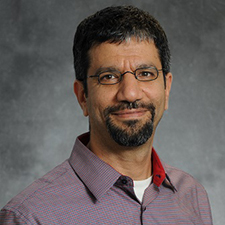 Walid Saleh (Ph.D. Yale University, 2001) is Professor of the History of Quranic Commentaries. He is a specialist on the Qur’an, the history of its interpretation (tafsir), the Arabic manuscript tradition, Islamic apocalyptic literature, and Muslim’s reception of the Bible. His first book, The Formation of the Classical Tafsir Tradition (Brill, 2004) was the first monograph length study of al-Thalabi (d. 1035) and his influence in the history of Qur’an commentary tradition. His second monograph, In Defense of the Bible (Brill, 2008), is a detailed study and an edition of al-Biqa`i’s (d. 1480) Bible treatise, “The Just Verdict on the Permissibility of Quoting from Old Scriptures,” which is the most extensive discussion of the place of the Bible in the Islamic religious tradition. His work with the JHI Working Group, Practices of Commentary, grew into a five-year (2020-2025) SSHRC Insight project.
Walid Saleh (Ph.D. Yale University, 2001) is Professor of the History of Quranic Commentaries. He is a specialist on the Qur’an, the history of its interpretation (tafsir), the Arabic manuscript tradition, Islamic apocalyptic literature, and Muslim’s reception of the Bible. His first book, The Formation of the Classical Tafsir Tradition (Brill, 2004) was the first monograph length study of al-Thalabi (d. 1035) and his influence in the history of Qur’an commentary tradition. His second monograph, In Defense of the Bible (Brill, 2008), is a detailed study and an edition of al-Biqa`i’s (d. 1480) Bible treatise, “The Just Verdict on the Permissibility of Quoting from Old Scriptures,” which is the most extensive discussion of the place of the Bible in the Islamic religious tradition. His work with the JHI Working Group, Practices of Commentary, grew into a five-year (2020-2025) SSHRC Insight project.
What I'm working on: A History of the Qur’an Commentary Tradition (Tafsir)
Tafsir is at the center of Islamic intellectual history. Tafsir is the prism through which the Qur’an has historically been mediated to believers. The Qur’an was and is understood through the language of tafsir, and much of what Muslims believe that the Qur’an says is actually from Qur’an commentaries. Therefore, tafsir is central to the religious history of Islam. My project is a book that charts the history of the tafsir genre. Understanding the history of how Muslims have approached and interpreted the Qur’an is a necessary step toward understanding Islamic intellectual history and assessing the current hermeneutical landscape of the Islamic religious tradition. It will address the questions of how it is possible to refuse higher criticism of the Qur’an in modernity and yet present a historical hermeneutical understanding that is cogent for the intellectual elites of the Islamic world, and why the medieval commentary tradition is still authoritative and how it is used. It has broader implications for the field of Islamic Studies in general, and how we understand the development of the modern Islamic intellectual tradition.


